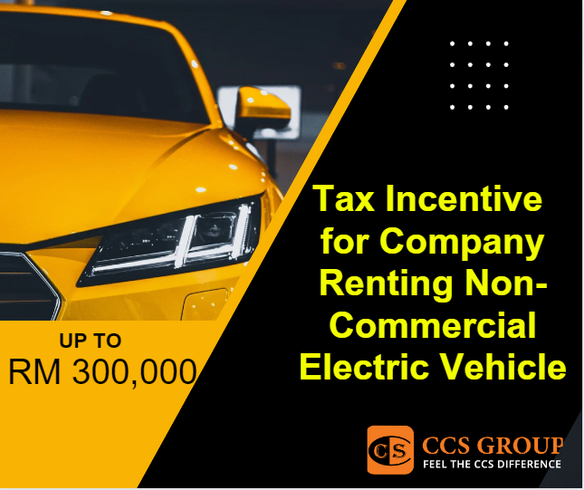Updated on 15 July 2023- Dialogue between MOF, LHDNM, and CTIM [21/6/2023]
Update: The Ismail Sabri Government Budget is no longer applicable. Malaysia’s national budget for 2023 was re-tabled again in February 2023.
To Download Revised Budget 2023 Speech and some other related publications – https://www.ccs-co.com/post/budget-2023-malaysia-madani
Current Position
Companies renting non-commercial motor vehicles, including Electric Vehicles (EV), are given tax deductions under Section 39(1)(k), Income Tax Act 1967, as follows:
- cost of the vehicle not exceeding RM150,000, the maximum rental amount allowed for tax deduction is limited up to RM100,000; and
- cost of the vehicle exceeding RM150,000, the maximum rental amount allowed for tax deduction is limited to RM50,000.
The tax treatment is effective from the year of assessment 2002.
Proposal
The maximum rental amount for electric vehicles that can be deducted for tax purposes is proposed to be capped at RM300,000 to incentivise the use of low-carbon automobiles.
Effective Date
From the year of assessment 2023 until the year of assessment 2025.
Updated on 15 July 2023- Dialogue between MOF, LHDNM, and CTIM [21/6/2023]
Currently, the capital allowance (“CA”) treatment for a non-commercial electric vehicle (“EV”) is provided under Para 2(2) of Sch 3 of the ITA 1967.

Similar to the above proposed RM300,000 limit for a tax deduction on rental, CTIM suggested that the limit for qualifying plant expenditure incurred on a non-commercial EV should be increased to RM300,000 in a corresponding PU Order on capital allowance to encourage usage of low-carbon vehicles and for neutral tax treatment on leased vehicles and purchased vehicles.
MOF’s Feedback:
This proposal has been duly noted.
However, MOF will conduct further studies on the impact of the proposal.

CTIM appreciated the Government’s policy to have incentives for short periods, but three years appears too short when adopting non-commercial EVs. It is recommended to have a longer window to provide more certainty for taxpayers who are considering this option.
MOF’s Feedback:
This proposal has been duly noted.
Introducing a 3-year leasing period is intended to assess companies’ acceptance and utilisation of green mobility.
By doing so, it will provide the government with the opportunity to review this initiative and make interventions/improvements if necessary.

CTIM sought confirmation on the above effective date means that the first rental for the noncommercial EV must be during the period from YA 2023 to YA 2025, and the tax deduction for the entire RM300,000 amount does not necessarily need to be claimed during this period.
For example, if the non-commercial EV is rented in 2025 and the company continues to pay for that same vehicle up to 2027, then the company can claim the tax deduction on the rental up to 2027 as long as the RM300,000 cap is not breached.
This same principle should apply to the CA CTIM asked for above as long as the non-commercial EV is purchased from YA 2023 to YA 2025.
MOF’s Feedback:
Details of tax treatments are being finalised.
Appendix 14 states “proposed company”. CTIM suggested that it should apply to any person carrying on a business.
Response from LHDNM (Inland Revenue Board):
The eligible companies for this incentive are companies as interpreted under Section 2 of the ITA 1967.

Disclaimer:
The articles, templates, and other materials on our website are provided only for your reference.
While we strive to ensure that the information presented is current and accurate, we cannot guarantee the completeness, reliability, suitability, or availability of the website or its content, including any related graphics. Consequently, any reliance on this information is entirely at your own risk.
If you intend to use the content of our videos and publications as a reference, we recommend that you take the following steps:
- Verify that the information provided is current, accurate, and complete.
- Seek additional professional opinions, as the scope and extent of each issue, may be unique.
免责声明:
我们网站上的文章、模板和其他材料只供参考。
虽然我们努力确保所提供的信息是最新和准确的,但我们不能保证网站或其内容,包括任何相关图形的完整性、可靠性、适用性或可用性。因此,您需要承担使用这些信息所带来的风险。
如果你打算使用我们的视频和出版物的内容作为参考,我们建议你采取以下步骤:
- 核实所提供的信息是最新的、准确的和完整的。
- 寻求额外的专业意见,因为每个问题的范围和程度,可能是独特的。
Keep in touch with us so that you can receive timely updates
请与我们保持联系,以获得即时更新。
1. Website ✍️ https://www.ccs-co.com/ 2. Telegram ✍️ http://bit.ly/YourAuditor 3. Facebook ✍
- https://www.facebook.com/YourHRAdvisory/?ref=pages_you_manage
- https://www.facebook.com/YourAuditor/?ref=pages_you_manage
4. Blog ✍ https://lnkd.in/e-Pu8_G 5. Google ✍ https://lnkd.in/ehZE6mxy
6. LinkedIn ✍ https://www.linkedin.com/company/74734209/admin/






